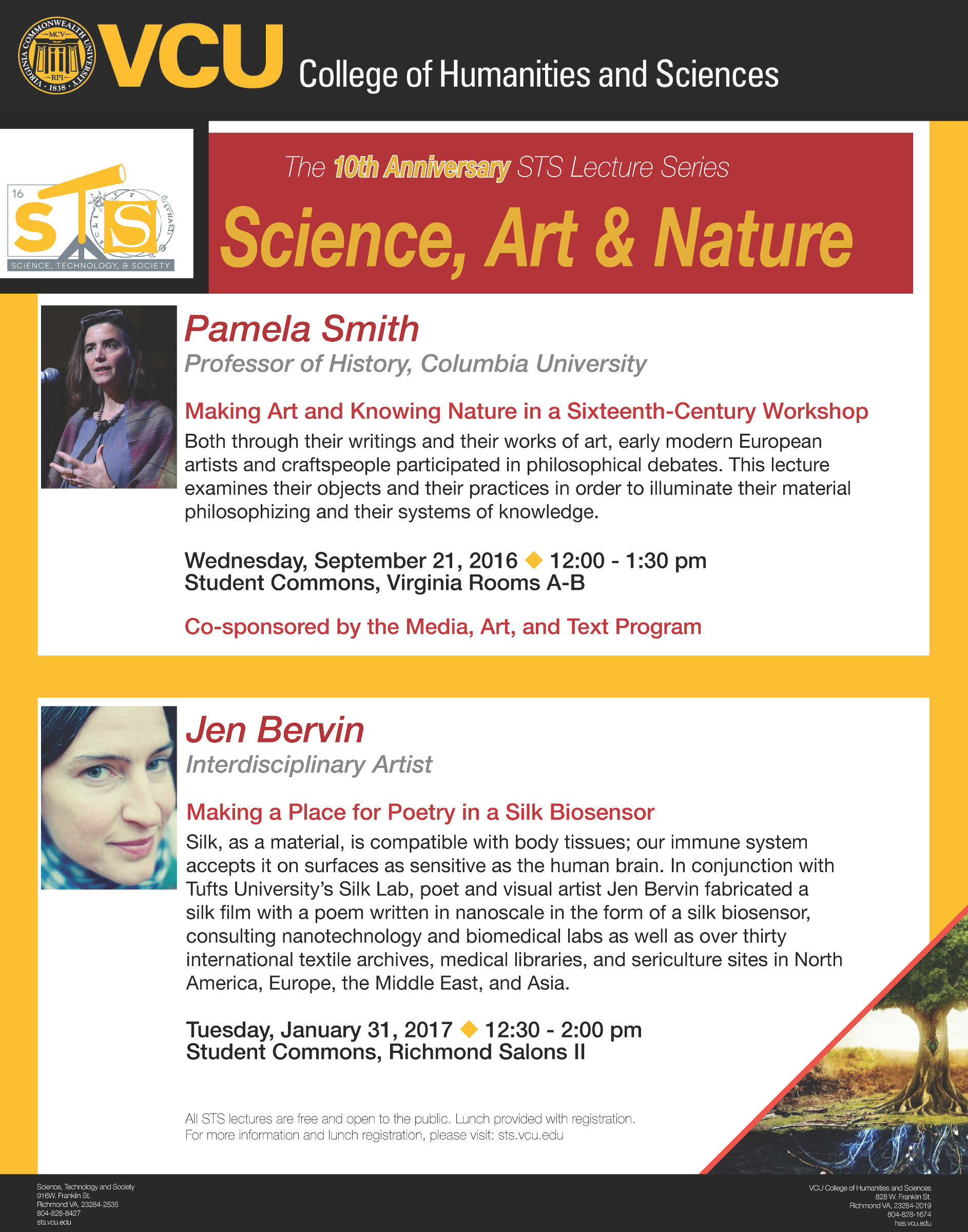Sept. 13, 2016
Lecture series to explore intersection of science, art and nature
Share this story
The Science, Technology and Society Program of the College of Humanities and Sciences will host a 10th anniversary lecture series featuring two talks — one by an expert on early modern European history and the history of science, the other by an interdisciplinary artist who incorporates scientific knowledge and techniques in her work. Both talks will address the same theme that inaugurated the program a decade ago: “Science, Art and Nature.”

“Given where VCU has come in the last 10 years, mounting and sustaining innovative art-science projects like the da Vinci Center, we feel like the time is right to critically examine these questions once again, to see where we have been and where we are going as a university in this socially relevant interdisciplinary arena,” said Karen Rader, Ph.D., director of STS@VCU, a professor in the Department of History and an affiliated faculty member of the Media Art & Text (MATX) Ph.D. Program.
Both lectures will be free and open to the public. Lunch will be provided with registration. To register, visit sts.vcu.edu.
“Making Art and Knowing Nature in a 16th Century Workshop”
Pamela Smith, Ph.D., the Seth Low Professor of History and director of the Center for Science and Society at Columbia University
Both through their writings and their works of art, early modern European artists and craftspeople participated in philosophical debates. This lecture examines their objects and their practices in order to illuminate their material philosophizing and their systems of knowledge.
Wednesday, Sept. 21, noon to 1:30 p.m.
University Student Commons, Virginia Rooms A-B
Co-sponsored by the Media, Art and Text Program.
“Making a Place for Poetry in a Silk Biosensor”
Jen Bervin, interdisciplinary artist
Silk, as a material, is compatible with body tissues; our immune system accepts it on surfaces as sensitive as the human brain. In conjunction with Tufts University’s Silk Lab, poet and visual artist Jen Bervin fabricated a silk film with a poem written in nanoscale in the form of a silk biosensor, consulting nanotechnology and biomedical labs as well as more than 30 international textile archives, medical libraries and sericulture sites in North America, Europe, the Middle East and Asia.
Tuesday, Jan. 21, 12:30 to 2 p.m.University Student Commons, Richmond Salons II
Ten years ago, the inaugural STS speaker series explored how art engages with science, and how science engages with art. It delved into questions such as: How have artistic and technological advances contributed to new understandings of science and nature over the past 400 years? Where do these understandings lie in relation to larger academic debates about the knowledge-making or visualization in science and culture? What impact have artists’ engagements with scientists had on the actual work of each cultural field, as well as on public understandings of these enterprises? And, ultimately, what can we learn from all of this about the relations between science and art as synergistic cultural activities?
“It's the 10th anniversary of the STS program and we are going back to our roots, revisiting some of the questions with which we started to see if the answers have changed or stayed the same,” Rader said. “In other words, doing a kind of historical stocktaking as a springboard for envisioning the future.”
Over the past 10 years, she said, the STS program has become recognized as an important institution serving Richmond and VCU.
“We've established stable, enduring pieces of popular programming, including our community partnership with Science Pub RVA, and curriculum, especially the medical humanities minor, that we will work hard to build and burnish further in the years ahead — all in ways that authentically serve both the VCU and the Richmond communities,” she said.
“But we are also more aware, as a result of the time and hard work that has already past, that none of our program’s successes would have been possible without the ongoing and visionary support of the College of Humanities and Sciences, as well as our VCU partners (schools and departments), especially our home department, the Department of History, and our wonderful colleagues there.”
Subscribe for free to the weekly VCU News email newsletter at http://newsletter.news.vcu.edu/ and receive a selection of stories, videos, photos, news clips and event listings in your inbox every Thursday.
Subscribe to VCU News
Subscribe to VCU News at newsletter.vcu.edu and receive a selection of stories, videos, photos, news clips and event listings in your inbox.












